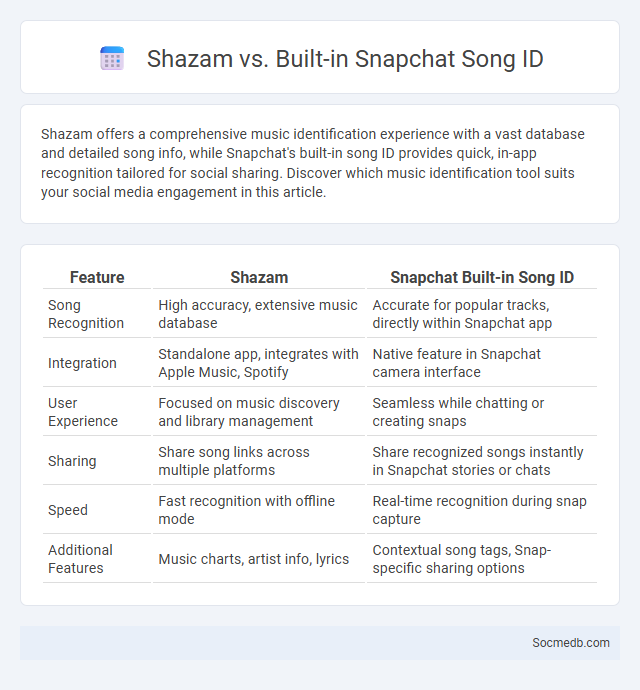
Photo illustration: Shazam vs built-in Snapchat song ID
Shazam offers a comprehensive music identification experience with a vast database and detailed song info, while Snapchat's built-in song ID provides quick, in-app recognition tailored for social sharing. Discover which music identification tool suits your social media engagement in this article.
Table of Comparison
| Feature | Shazam | Snapchat Built-in Song ID |
|---|---|---|
| Song Recognition | High accuracy, extensive music database | Accurate for popular tracks, directly within Snapchat app |
| Integration | Standalone app, integrates with Apple Music, Spotify | Native feature in Snapchat camera interface |
| User Experience | Focused on music discovery and library management | Seamless while chatting or creating snaps |
| Sharing | Share song links across multiple platforms | Share recognized songs instantly in Snapchat stories or chats |
| Speed | Fast recognition with offline mode | Real-time recognition during snap capture |
| Additional Features | Music charts, artist info, lyrics | Contextual song tags, Snap-specific sharing options |
Overview of Music Recognition: Shazam vs Snapchat Song ID
Shazam and Snapchat Song ID both use audio recognition technology to identify music tracks quickly and accurately, with Shazam focusing solely on music detection while Snapchat Song ID integrates this feature within its social media platform. Shazam's vast song database and robust algorithm provide a more comprehensive music identification experience, whereas Snapchat Song ID offers seamless sharing and interactive engagement through Stories and Snaps. Both tools enhance music discovery, but Shazam remains the preferred choice for dedicated music enthusiasts due to its precision and extensive metadata.
How Shazam Works: Key Features and Technology
Shazam uses advanced audio recognition technology to identify songs by analyzing sound waves captured from your device's microphone and comparing them to a vast database of music fingerprints. Its key features include real-time music recognition, automatic song tagging, and seamless integration with streaming services like Spotify and Apple Music. By leveraging machine learning algorithms and large-scale data processing, Shazam delivers accurate and instant results for your music discovery needs.
Built-in Snapchat Song ID: An Introduction
Snapchat's built-in Song ID feature enables users to instantly identify music playing in their surroundings, enhancing social media interaction through seamless audio recognition. Leveraging advanced audio fingerprinting technology, this tool integrates with Snapchat's augmented reality and multimedia capabilities to provide real-time song metadata. Users can easily save, share, and discover new music within the Snapchat app, driving increased engagement and content personalization.
Shazam Integration with Snapchat: How It Functions
Shazam integration with Snapchat enables users to identify songs playing around them directly within the Snapchat app by tapping the music icon or holding down the camera screen. Once a song is recognized, Snapchat instantly provides song details, artist information, and relevant media like music videos or Snap stories. This seamless functionality enhances user engagement by merging audio recognition technology with immersive social sharing features.
Accuracy Comparison: Snapchat Song ID vs Shazam
Snapchat Song ID and Shazam both offer music recognition powered by advanced audio fingerprinting technology, but Shazam provides more accurate results due to its extensive music database and frequent updates. Snapchat Song ID works seamlessly within the app for quick song identification in social contexts, yet it may miss less popular tracks that Shazam's richer catalog captures effectively. To ensure your music discoveries are precise, relying on Shazam's proven accuracy is a smart choice when identifying songs on the go.
User Experience: Interface and Ease of Use
A seamless social media interface enhances user engagement by prioritizing intuitive navigation and clear visual hierarchy, reducing cognitive load for Your convenience. Features like customizable feeds, quick-loading content, and accessible design elements improve overall ease of use, promoting longer session durations and higher satisfaction rates. Optimizing these components ensures that users can effortlessly interact, share, and consume content on any device or platform.
Song Database Coverage: Shazam vs Snapchat
Shazam offers an extensive song database coverage with over 70 million tracks, enabling accurate music identification across various genres and languages. Snapchat's music recognition relies on integration with SoundCloud and other partners, providing more limited song identification features compared to Shazam. Shazam's advanced audio fingerprinting technology ensures superior detection speed and accuracy in diverse social media environments.
Speed and Performance: Real-time Identification
Real-time identification on social media platforms enables instantaneous detection of trending topics, user interactions, and potential security threats, enhancing overall speed and performance. Advanced algorithms process massive streams of data swiftly, ensuring timely content delivery and user engagement. This capability significantly reduces latency and improves the responsiveness essential for dynamic social media environments.
Additional Features: Beyond Song Identification
Social media platforms extend beyond song identification by offering features such as real-time lyric sharing, collaborative playlists, and music-based challenges that enhance user engagement. Integration with streaming services allows seamless song playback and direct links to purchase or save tracks, boosting music discovery. Advanced algorithms personalize recommendations based on social interactions, listening habits, and trending content, creating a dynamic and immersive musical experience.
Which Option is Better for Music Discovery?
Exploring music discovery on social media reveals that platforms like TikTok and Instagram provide dynamic, algorithm-driven recommendations tailored to your tastes, making them excellent for uncovering trending artists and viral hits. In contrast, services such as Spotify and Apple Music use curated playlists and user behavior analytics to introduce you to diverse genres and emerging musicians with deeper personalization. Your choice depends on whether you prefer spontaneous exposure through social media or structured, data-driven recommendations from dedicated music streaming services.
 socmedb.com
socmedb.com